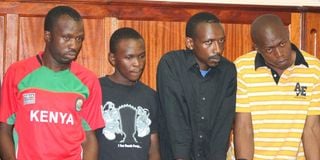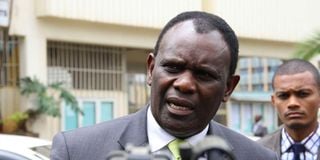Suspects in MP George Muchai murder case seek acquittal as defence hearing begin

From left: Stephen Astiva, Mustafa Kimani, Raphael Kimani and Erick Isabwa in a Nairobi court where they were charged alongside three others with the murder of former Kabete MP George Muchai, his driver and two bodyguards.
What you need to know:
- Justice Alexander Muteti of the High Court later directed the magistrate to allow the suspects to defend themselves, prompting them to reconsider their position.
- Eric Isabwa, the first to testify, denied the charges and stated that the prosecution's witnesses had misled the court.
The seven suspects linked to the murder of former Kabete Member of Parliament George Muchai, his two bodyguards, and his driver began their defence hearing on Friday, January 17, urging the court to acquit them.
The suspects argued that the prosecution had failed to prove its case against them in the murder of Mr Muchai, his bodyguards Samuel Kailikia and Samuel Matanta, and driver Stephen Wambugu.
The beginning of their defence follows a ruling by Chief Magistrate Lucas Onyina allowing the suspects to present their case after being found with a case to answer for the killings that occurred on February 6, 2015, in Nairobi’s Central Business District (CBD).

Former Kabete MP George Muchai who was assassinated on a Nairobi street in 2015.
The seven suspects are Erick Muyera Isabwa alias Chairman, Raphael Kimani alias Butcher, Mustafa Kimani alias Musto, Stephen Asitiva Lipapo alias Chokori, Jane Wanjiru Kimani alias Shiro, Margaret Njeri alias Waciuri, and Simon Wambugu.
They had earlier declined to offer their defence, accusing the magistrate of bias.
Justice Alexander Muteti of the High Court later directed the magistrate to allow the suspects to defend themselves, prompting them to reconsider their position.
Eric Isabwa, the first to testify, denied the charges and stated that the prosecution's witnesses had misled the court.
Isabwa claimed he was arrested on February 15, 2015, at Marikiti Market, where he sold tomatoes.
He alleged he was beaten during the arrest, resulting in injuries to his arm and thumb.
He also disputed the prosecution’s claim that he was arrested in Kinoo with his co-accused, Jane Wanjiru, asserting that he was unaware of the alleged location.
"I never knew the accused persons before, have not met or communicated with them before my arrest. I saw them my first time in court," he told the court.
He denied ever seeing the G3 rifle, blue bag, black hooded mask, or other items listed in the inventory, allegedly recovered during the arrest.
Isabwa refuted the prosecution's evidence of constant communication between him and the other accused, as presented through Safaricom records.
The accused disputed claims that his mobile phone signal was active in the crime area during the offence, calling the Safaricom data fabricated.
The prosecution, which had called 36 witnesses, including police officers, closed its case earlier.
The evidence included Safaricom communication records allegedly linking the accused to the crime scene and each other.
The defence hearing is set to resume on February 3, 2025, and will run for three consecutive days, before the conclusion of the high-profile case that has gripped national attention for nearly a decade.


